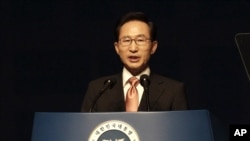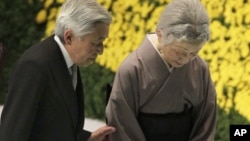SEOUL – Government officials in Tokyo and Seoul marking the anniversary of the end of war in the Pacific are aggravating lingering grievances stemming from their colonial past.
A children's choir sang as attendees waved South Korean flags to mark the 67th anniversary of the liberation of the peninsula from decades of Japanese colonial rule.
Old wounds
At the ceremony, President Lee Myung-bak called on Japan to help heal old wounds. He specifically mentioned festering grievances about the Japanese military's wartime prostitution of Korean women, something Lee termed a violation of "universal human rights and historic justice."
President Lee says while Japan is a close neighbor, a friend sharing basic values and an important trading partner, the chain links tangling their mutual history is affecting regional and bilateral ties. He requests Tokyo resolve the so-called "comfort women" issue.
Lee's government was quick to express regret over visits by two Japanese cabinet members to a Tokyo shrine viewed in Japan's former colonies as a symbol of its wartime aggression.
Explanations
Jin Matsubara, who holds several Cabinet portfolios including National Public Safety Commission chairman, says he visited the war shrine in a personal capacity.
The cabinet minister says he went to Yasukuni - where the souls of those enshrined include convicted top class war criminals - to "remember ancestors who established the foundation of Japan's present-day prosperity."
Prime Minister Yoshihiko Noda asked ministers to refrain from going to the shrine. Such visits always cause diplomatic fallout. This marks the first time sitting members of a Democratic Party of Japan cabinet have prayed at Yasukuni.
Island visit
The move by the DPJ politicians comes after the South Korean president raised tensions when he made an unprecedented visit last week to a tiny island, Liancourt Rocks, controlled for decades by his country, but also claimed by Japan. In response to Lee's brief trip, Tokyo recalled its ambassador from Seoul.
On Wednesday, Japan lodged a diplomat protest against President Lee for saying any visit to South Korea by Emperor Akihito must be preceded by a sincere apology from the monarch for Japan's brutal colonial rule of the Korean peninsula.
Japanese war victims
Emperor Akihito and Empress Michiko, at precisely noon in Tokyo, bowed their heads at a national ceremony to remember the more than two million Japanese military and civilian deaths during the five-year Pacific War.
Reflecting on history, the son of the monarch in whose name Japan waged the war says he sincerely wishes "the tragedy of war will not be repeated."
Emperor Akihito said that along with all Japanese, he wants to pay a heartfelt tribute to those who lost their lives on the battlefield and due to the ravages of war.
Prime Minister Noda, also at the event, noted Japan "caused considerable damage and pain to people in many countries, particularly in Asia."
Noda added that Japan's peace and prosperity are the result of those who reluctantly made the ultimate sacrifice during the war.
Asked about the unresolved historical disputes between Seoul and Tokyo, State Department spokeswoman Victoria Nuland said the United Sates does not take a position and encourages its two allies "to work this out together."
December meeting
The South Korean president and the Japanese prime minister are scheduled to meet in December, when Lee will have just two months remaining in office.
Lee, with a low popularity rating at home, is ineligible to run for re-election under South Korea's current system limiting presidents to a single five-year term.
His provocative island visit and recent statements have also prompted some domestic criticism, including those who contend the lame duck president is creating a diplomatic mess his successor will be forced to clean up.
China
Meanwhile, Japan has filed a complaint with China after a group of activists from Hong Kong landed Wednesday on Uotsurijima, one of the small islands held by Tokyo and claimed by Beijing.
Japanese media report that the coast guard is taking 14 people, including one reporter, to a port in Okinawa after their arrests for violating the immigration control law.
The disputed island group, which is uninhabited, is known as Diaoyu in Chinese and Senkaku in Japanese.
Japan also has an unresolved territorial dispute with Russia going back to August 1945, when Red Army troops seized islands off Hokkaido in the closing days of WWII.
The Interfax news agency reports Russia's Pacific Fleet has announced two of its warships will visit the disputed territory beginning August 25 to honor those who died battling the Imperial Japan Army.
A children's choir sang as attendees waved South Korean flags to mark the 67th anniversary of the liberation of the peninsula from decades of Japanese colonial rule.
Old wounds
At the ceremony, President Lee Myung-bak called on Japan to help heal old wounds. He specifically mentioned festering grievances about the Japanese military's wartime prostitution of Korean women, something Lee termed a violation of "universal human rights and historic justice."
President Lee says while Japan is a close neighbor, a friend sharing basic values and an important trading partner, the chain links tangling their mutual history is affecting regional and bilateral ties. He requests Tokyo resolve the so-called "comfort women" issue.
Lee's government was quick to express regret over visits by two Japanese cabinet members to a Tokyo shrine viewed in Japan's former colonies as a symbol of its wartime aggression.
Explanations
Jin Matsubara, who holds several Cabinet portfolios including National Public Safety Commission chairman, says he visited the war shrine in a personal capacity.
Yasukuni War Shrine Facts
Facts about Tokyo's controversial Yasukuni Shrine- Shinto shrine built in 1869 to enshrine the souls of around 2.5 million war dead
- Commemorates 14 men convicted of war crimes after Japan's World War II surrender
- Seen by many Asians as symbol of Japan's brutal imperialistic era
- Has become a rallying point for some conservative Japanese lawmakers
The cabinet minister says he went to Yasukuni - where the souls of those enshrined include convicted top class war criminals - to "remember ancestors who established the foundation of Japan's present-day prosperity."
Prime Minister Yoshihiko Noda asked ministers to refrain from going to the shrine. Such visits always cause diplomatic fallout. This marks the first time sitting members of a Democratic Party of Japan cabinet have prayed at Yasukuni.
Island visit
The move by the DPJ politicians comes after the South Korean president raised tensions when he made an unprecedented visit last week to a tiny island, Liancourt Rocks, controlled for decades by his country, but also claimed by Japan. In response to Lee's brief trip, Tokyo recalled its ambassador from Seoul.
On Wednesday, Japan lodged a diplomat protest against President Lee for saying any visit to South Korea by Emperor Akihito must be preceded by a sincere apology from the monarch for Japan's brutal colonial rule of the Korean peninsula.
Japanese war victims
Emperor Akihito and Empress Michiko, at precisely noon in Tokyo, bowed their heads at a national ceremony to remember the more than two million Japanese military and civilian deaths during the five-year Pacific War.
Reflecting on history, the son of the monarch in whose name Japan waged the war says he sincerely wishes "the tragedy of war will not be repeated."
Emperor Akihito said that along with all Japanese, he wants to pay a heartfelt tribute to those who lost their lives on the battlefield and due to the ravages of war.
Prime Minister Noda, also at the event, noted Japan "caused considerable damage and pain to people in many countries, particularly in Asia."
Noda added that Japan's peace and prosperity are the result of those who reluctantly made the ultimate sacrifice during the war.
Asked about the unresolved historical disputes between Seoul and Tokyo, State Department spokeswoman Victoria Nuland said the United Sates does not take a position and encourages its two allies "to work this out together."
December meeting
The South Korean president and the Japanese prime minister are scheduled to meet in December, when Lee will have just two months remaining in office.
Lee, with a low popularity rating at home, is ineligible to run for re-election under South Korea's current system limiting presidents to a single five-year term.
His provocative island visit and recent statements have also prompted some domestic criticism, including those who contend the lame duck president is creating a diplomatic mess his successor will be forced to clean up.
China
Meanwhile, Japan has filed a complaint with China after a group of activists from Hong Kong landed Wednesday on Uotsurijima, one of the small islands held by Tokyo and claimed by Beijing.
Japanese media report that the coast guard is taking 14 people, including one reporter, to a port in Okinawa after their arrests for violating the immigration control law.
The disputed island group, which is uninhabited, is known as Diaoyu in Chinese and Senkaku in Japanese.
Japan also has an unresolved territorial dispute with Russia going back to August 1945, when Red Army troops seized islands off Hokkaido in the closing days of WWII.
The Interfax news agency reports Russia's Pacific Fleet has announced two of its warships will visit the disputed territory beginning August 25 to honor those who died battling the Imperial Japan Army.







